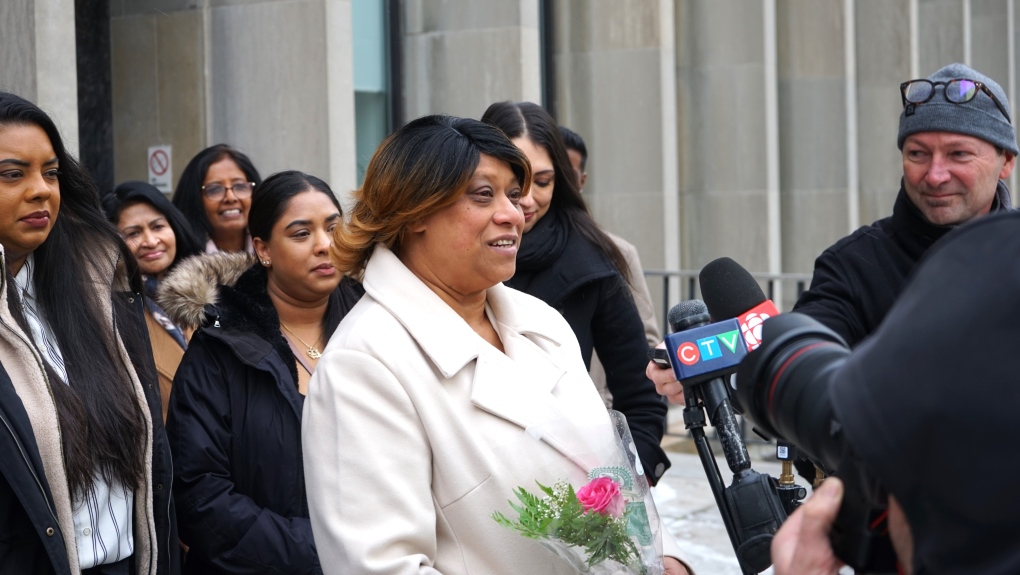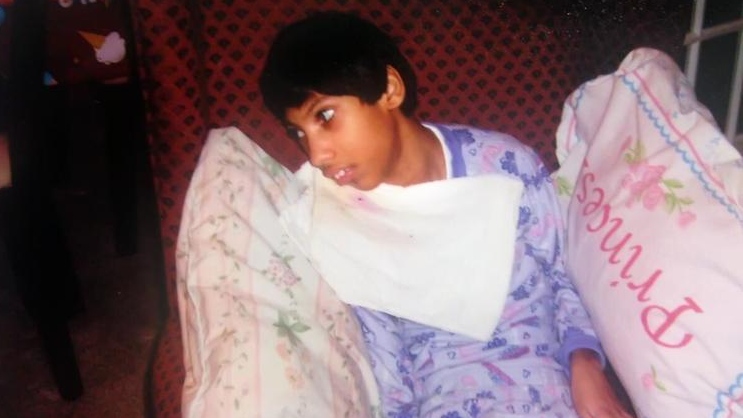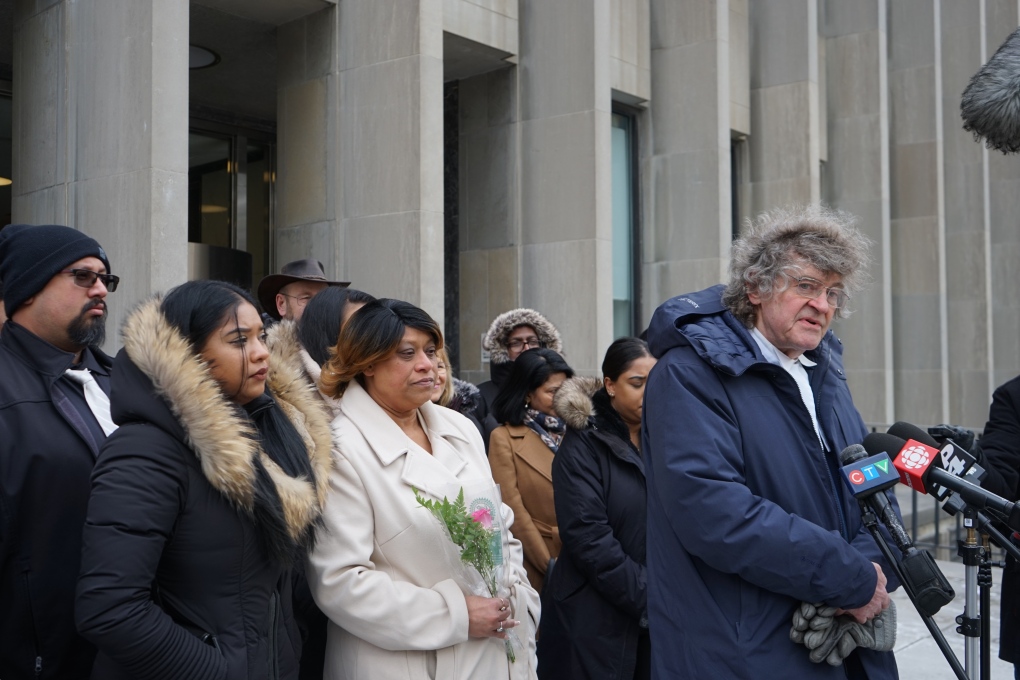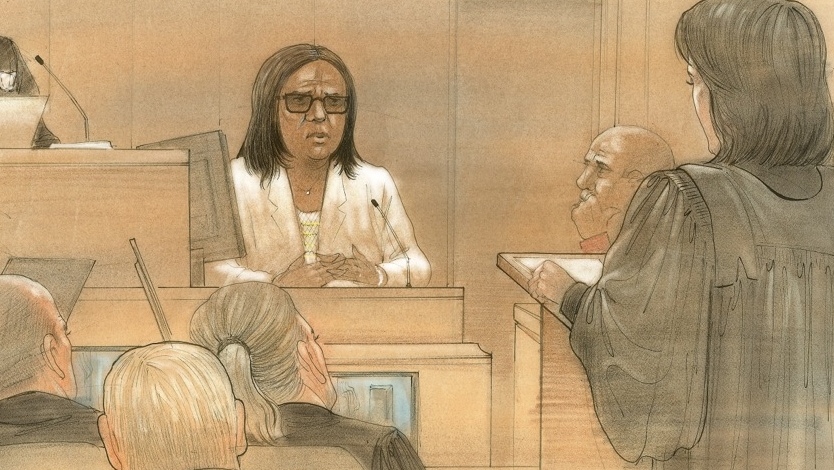Toronto mother acquitted of first-degree murder charge in disabled daughter's death
Cries of relief rang out in a downtown courtroom on Friday as a Toronto mother formerly sentenced to life in connection with the death of her disabled teenage daughter was acquitted of first-degree murder.
Ontario Superior Court Justice Jane Kelly handed down the verdict to a courtroom full of Cindy Ali's family, friends, and supporters. She also found Ali not guilty of the lesser offences of second-degree murder and manslaughter presented by Crown attorney Beverley Olesko.
- Download our app to get local alerts on your device
- Get the latest local updates right to your inbox
Ali, standing outside of the courthouse following the verdict, told reporters the decision will allow her family – her husband Allan and three daughters, Amanda, Carissa and Clarissa – the opportunity to properly grieve Cynara after almost 13 years.
“It’s been a really tough road for us,” Ali said, standing beside her family and counsel James Lockyer and Jessica Zita. “Now, it’s time for my family to start healing and grieving.”
 Cindy Ali can be seen above. The Toronto mother was formerly convicted of first-degree murder in the 2011 death of her daughter, Cynara, before being acquitted by a judge Friday. (Abby O'Brien)
Cindy Ali can be seen above. The Toronto mother was formerly convicted of first-degree murder in the 2011 death of her daughter, Cynara, before being acquitted by a judge Friday. (Abby O'Brien)
Cynara died at Toronto’s Hospital for Sick Children in February 2011 after what Ali has always maintained was a home invasion at her Scarborough townhouse.
According to Ali, two men broke into the home on the morning of Feb. 19, looking for a “package.” She told police that one of the men escorted her room-to-room, searching for the item. When Ali returned to the living room, she said she found Cynara lifeless on the couch and the other man standing next to her daughter, a pillow in hand.
The two men were never found.
 Cynara Ali can be seen above. (Superior Court of Justice Exhibit)
Cynara Ali can be seen above. (Superior Court of Justice Exhibit)
After Cindy called 911 to report the break-in, first responders found Cynara without vital signs. She was resuscitated and brought to the hospital, where she died just over a day later.
After more than a year of investigation by Toronto police, Ali was charged in March 2012 with manslaughter, upgraded seven months later to first-degree murder.
Speaking outside the courtroom Friday, Ali’s counsel James Lockyer told reporters that he believed that police rushed to a judgment. In his final arguments, Lockyer suggested that a year-long investigation had turned up nothing of significance.
When reached for comment, Toronto police said it conducted a "thorough and comprehensive" investigation into Cynara's death.
"As is the right of any convicted individual, an appeal of the conviction was applied for and granted, and today the presiding Justice found Ms. Ali not guilty," a spokesperson for the service said in a written statement. "The criminal justice system worked as it was designed to."
 Criminal defence lawyer James Lockyer speaks to reporters following the acquittal of Cindy Ali on Jan. 19, 2023. (Abby O'Brien)
Criminal defence lawyer James Lockyer speaks to reporters following the acquittal of Cindy Ali on Jan. 19, 2023. (Abby O'Brien)
Four years after she was charged, Ali's case went to trial.
The Crown suggested that Cynara, who lived with celebral palsy and epilepsy, and required full-time care, had grown too heavy a burden on the family. According to the prosecution, Ali smothered Cynara and staged the home to look as if a break-in had occurred.
Ali maintained her account of the home invasion, arguing that Cynara was never a burden but rather a blessing to the family -- a sentiment echoed by many of Ali's supporters, including her eldest daughter, husband, and pastor in court testimony. By all accounts, Cindy had always been a loving and caring mother, they said.
A jury deliberated for less than 10 hours before convicting Ali of first-degree murder, handing her a life sentence with no chance of parole.

After winning an appeal that argued instructions given to the jury by the judge had been too narrow, Ontario's highest court granted a new, judge-alone trial. The proceedings began on Oct. 16, 2023.
In Ali’s retrial, the prosecution argued a new motive – that a series of seizures suffered by Cynara in the days before her death sparked a fear in Ali. Olesko suggested that, at that moment, Cindy, knowing Cynara had lived well past her life expectancy, concluded that her daughter’s quality of life would also stand to worsen as time went on. It was with this in mind that Cindy staged her home before smothering her daughter in an act of mercy, the Crown put forth in its motive.
Again, Cindy denied all allegations put to her, reiterating that she loved her daughter deeply and cared for her to the best of her ability.
Reading her decision Friday, Kelly told the court that she was left in a “state of uncertainty” on where “the truth of the matter lies” when it came to Ali's home invasion claim, but that, ultimately, the Crown had failed to prove beyond a reasonable doubt that she had killed her daughter.
“Having reviewed all the evidence in this case, I have a reasonable doubt about Mrs. Ali’s guilt,” Kelly said. “I acquit Mrs. Ali of first-degree murder.”
As Ali approached the outside of the courthouse to speak to reporters, snow began to fall, which she interpreted as a sign from Cynara.
"That's her saying, 'We did it, mom,'" Ali said, holding a single rose, gifted to her by a member of her congregation.
When asked how she would begin to rebuild a sense of trust in public institutions, Ali told reporters it would take time.
“It’s not easy, it will take time, but now, we get to be free.”
 Supporters of the Ali family can be seen holding a sign that reads 'Justice for Cindy! A loving mother full of integrity' outside of the Superior Court of Justice in Toronto on Friday, Jan. 19. (Abby O'Brien)
Supporters of the Ali family can be seen holding a sign that reads 'Justice for Cindy! A loving mother full of integrity' outside of the Superior Court of Justice in Toronto on Friday, Jan. 19. (Abby O'Brien)
CTVNews.ca Top Stories

'They thought he wasn't making it': B.C. soccer star's family on his shocking shooting — and remarkable recovery
Born and raised in Metro Vancouver, Nathan Demian was living his dream playing soccer for top-ranked Ohio State University, when he was shot during a post-game pizza run with his brother Saturday night.
MPs approve $21.6B in supplementary spending; Conservatives vote against
Parliament has approved $21.6 billion in government spending, in a late Tuesday vote in the House of Commons.
No injuries reported after gunshots fired inside Etobicoke high school, 2 suspects outstanding
Toronto police are searching for two suspects after gunshots were fired inside an Etobicoke high school late Tuesday afternoon.
DEVELOPING Luigi Mangione shouts as he is led into courthouse where he contests extradition to N.Y.
The suspect in the killing of UnitedHealthcare’s CEO struggled with deputies and shouted Tuesday while arriving for a court appearance in Pennsylvania, a day after he was arrested at a McDonald’s and charged with murder.
Celebrities and coastal residents flee from wind-driven wildfire in Malibu
Evacuation orders and warnings have gone out to 20,000 Southern California residents Tuesday as firefighters battled a wind-driven wildfire in Malibu that burned near celebrities' seaside mansions, horse farms and Pepperdine University, the sheriff's department said.
Waterloo Region mistakenly applied $13.7M discount to Amazon build in Blair
The Region of Waterloo will not be able to demand $13.7 million from a developer after they said a discount was mistakenly issued for the development of an Amazon fulfillment centre.
Dolly Parton explains why her longtime husband doesn't attend events with her
Dolly Parton has been married for 58 years, but you probably could count on one hand the times you have seen her with her husband.
'Which one of those two is going to win?': Poilievre prods Trudeau, Freeland over spending tension
Revived talk of tensions between Prime Minister Justin Trudeau and Deputy Prime Minister and Finance Minister Chrystia Freeland prompted new questions Tuesday, about how big the federal deficit will be in next week's economic update.
Ex-minister cites 'threat to security' for denying emergency passport to Abdelrazik
Former foreign minister Lawrence Cannon says he denied an emergency passport to Abousfian Abdelrazik in 2009 because he considered the Montreal man a possible threat to national security.


































